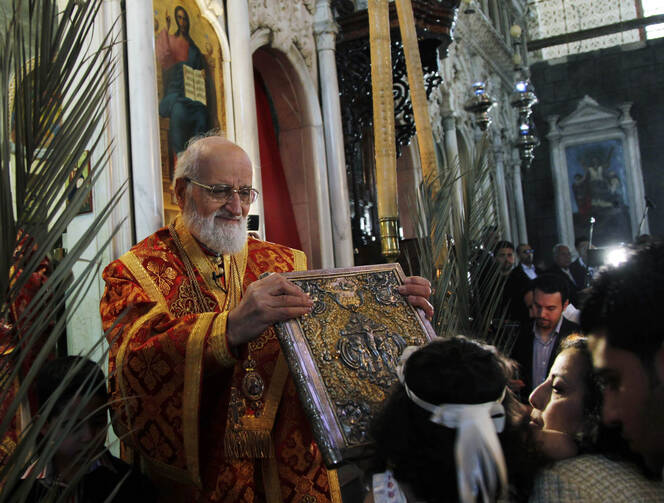BEIRUIT (CNS) -- Syrian-born Melkite Catholic Patriarch Gregoire III Laham warned against armed intervention in his country, saying, “It has brought us to the tragedy we are now living in Syria.”
Speaking to Catholic News Service by phone Aug. 27 from the patriarchal summer residence in Ain Traz, Lebanon, the patriarch said such a step “would be a tragedy, a tragedy, a tragedy—for the whole country and the whole Middle East.”
“Enough with the intervention,” he said.
“It is fueling hatred, fueling criminality, fueling inhumanity, fueling fundamentalism, terrorism—all these things are the fruit of intervention. Enough!”
“Surely, it will spread like a world war,” he said.
The patriarch lamented the U.S. decision to postpone again a meeting with Russia aimed at preparing for a peace conference on Syria.
“The Holy Father was very clear on Aug. 25,” the patriarch said, referring to Pope Francis’ call for peace in Syria during the Sunday Angelus, when the pontiff said, “It is not clashes, but an ability to meet and to dialogue that offers prospects for a hope of resolving the problems.”
“This is the real voice to be heard, and not the voice of weapons and interventions and of warships,” Patriarch Laham said.
“Instead of trying to change the (Syrian) government, help the government to change. We are all for change. We are all for reforms. But not in this way, with blood.”
The patriarch said external intervention “is destroying the whole sense of community, of friendship of love between peoples, of conviviality, of living together, Christians and Muslims.”
“Why send weapons? Why send criminals?” the patriarch asked, noting that Syria is “now a place for every criminal in the world,” referring to fighters coming into Syria from other countries.
“Why send people to fight? Why bring people from abroad? It is fueling hatred among the people.”
The patriarch said the Syrian opposition had the right to “speak to the government and ask what they have to ask.”
“But criminals coming from outside, why?”
Patriarch Laham, who divides his time between Syria and the patriarchate in Lebanon, said he was happy to be among the people in Syria, but he stressed they are “living in fear, in a very uncertain situation.”
“Every place in Damascus and in Syria is unsafe. There is chaos and insecurity in all places,” he said.
On Aug. 26, the patriarch said, a mortar shell hit between the Melkite and the neighboring Armenian Orthodox patriarchates in Damascus. On the same day, another mortar shell destroyed the entrance of the Syrian Orthodox Patriarchate in the same neighborhood.
“This is very harsh and very tragic,” he said.
“We pray, we pray, because clearly the key to peace in the Middle East is related to a political and peaceful solution of the crisis in Syria. Thus, the key to the solution of the Palestinian conflict is now related to peace in Syria.
“Peace in Syria and in Palestine is the key for peace in the Middle East and the whole world,” he said.
(Photo credit: Catholic News Service/Reuters)








